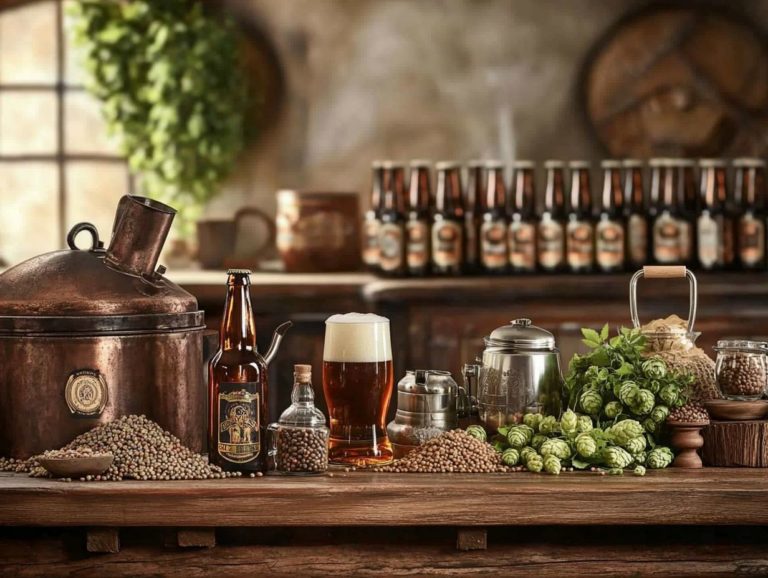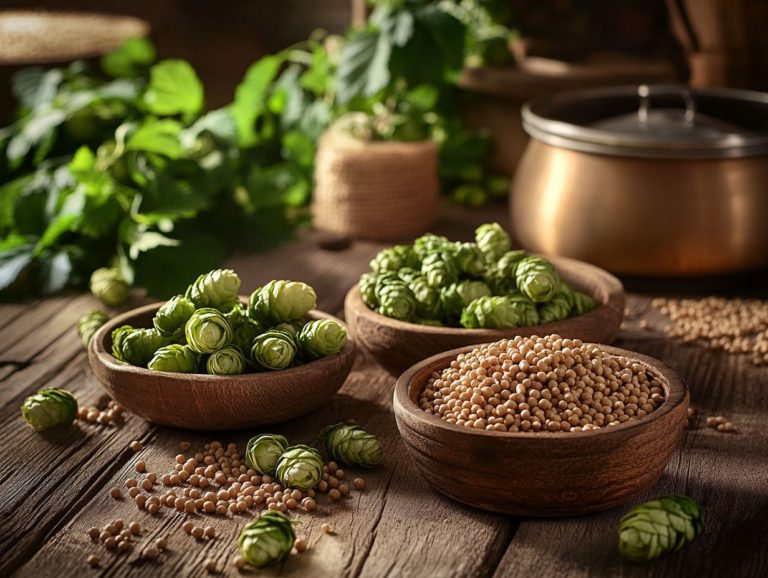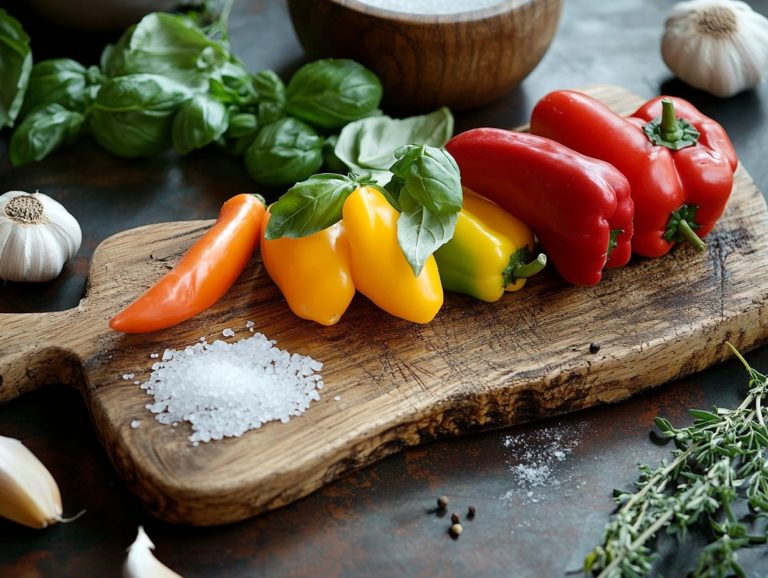Maximizing Efficiency in Your Brewing Process
Brewing beer is an exquisite blend of artistry and scientific precision. Grasping the nuances that influence efficiency can significantly enhance your final product. This includes understanding the brewing science that underpins every step.
From the quality of your ingredients to the chemistry of your brewing water, each component is vital in determining how effectively you can convert raw materials into a delightful brew.
This article delves into the essential factors that impact brewing efficiency, offering valuable tips to refine your brewing process and highlighting common pitfalls to sidestep.
Whether you re a seasoned brewer or taking your first steps into this captivating world, optimizing your brewing efficiency has the potential to take your creations to the next level!
Contents
- Maximizing Efficiency in Brewing
- Measuring Brewing Efficiency
- Tips for Maximizing Efficiency in Brewing
- Avoid These Common Brewing Mistakes for Better Efficiency!
- Frequently Asked Questions
- What is the importance of maximizing efficiency in your brewing process?
- How can I calculate my brewing efficiency?
- What are some ways to increase efficiency in my brewing process?
- How can I ensure consistency in my brewing efficiency?
- What are some common factors that can affect brewing efficiency?
- What are some potential consequences of low brewing efficiency?
Key Takeaways:
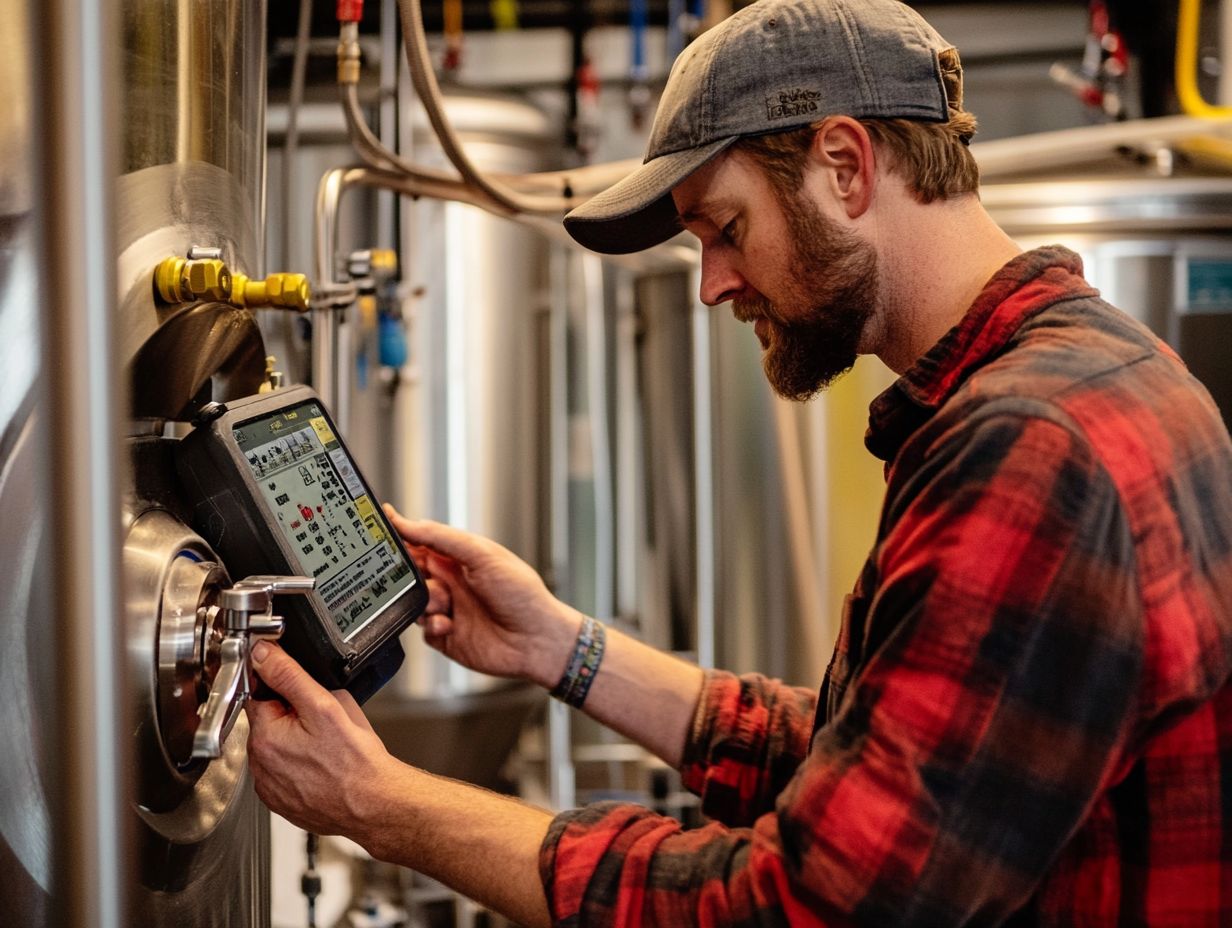
- Use high-quality ingredients to ensure a more efficient brewing process.
- Properly treating water and optimizing equipment and techniques, including regular maintenance, can greatly increase efficiency.
- Maintaining consistent temperature and time control is crucial in maximizing efficiency during the brewing process.
Start applying these tips today to see amazing results in your brewing!
Factors Affecting Efficiency in Brewing Process
The efficiency of your brewing process is shaped by many factors that affect how well your brewing works. This includes the quality of your ingredients, the chemistry of your brewing water, the equipment you choose, and the techniques you apply throughout the brewing journey. Effective mash efficiency and detailed records are also crucial factors.
Gaining a deep understanding of these elements enables you to optimize your brewing systems, ultimately enhancing both the quality and consistency of your beer. For craft beer producers like you, focusing on these critical aspects can significantly elevate your creations, allowing your unique and high-quality brews to shine in the competitive landscape of the brewing industry.
1. Quality of Ingredients and Grain Milling
The quality of the ingredients you use in the brewing process is paramount; it directly shapes the taste and overall quality of your beer. This selection greatly influences mash efficiency, fermentation processes, and the unique flavors that define your craft beer.
Choosing high-quality malted grains is essential, as they are key to extracting the sugars necessary for fermentation. Techniques such as grain milling ensure efficient sugar extraction. Likewise, the hops you select significantly impact the bitterness and aroma profiles that distinguish various beer styles. And let s not forget about yeast the star of fermentation. It transforms those sugars into alcohol and CO2, adding depth and complexity to your beer s mouthfeel.
By prioritizing these premium ingredients, you not only enhance your brewing effectiveness but also craft a diverse range of flavors. This approach ensures that the final product is a true reflection of your brewing vision and expertise. Regular quality control tests are essential to maintain this standard.
2. Water Chemistry
Water chemistry is an essential part of your brewing process, as the composition of your brewing water can significantly influence pH levels, enzymatic activity, and overall efficiency. You need to optimize your water treatment methods. Proper water usage management is also crucial.
The balance of your brewing water is often shaped by various minerals and compounds, such as calcium, magnesium, and bicarbonates. Each of these plays a key role in flavor extraction and the stability of your final product. Techniques like sparging, which is rinsing the grains to extract more sugars, and calibration are important to maintain this balance. A well-calibrated brewing environment not only promotes optimal fermentation conditions but also ensures that the desired characteristics of your brew are fully realized.
Improper pH levels can disrupt enzymatic processes, leading to disappointing yields. To help you navigate this delicate balancing act, consider investing in energy-efficient equipment, like water pH and mineral analyzers. Using rice hulls can also help improve mash efficiency. These tools enable you to monitor and adjust your water chemistry effectively, ensuring that every batch you produce meets the highest standards.
Maximizing Efficiency in Brewing
3. Equipment, Techniques, and Training Sessions
The choice of brewing equipment and the techniques you employ during the brewing process are critical for optimizing efficiency. Well-maintained stainless steel fermentation tanks and automated systems can significantly streamline your operations while enhancing the overall quality of your beer.
Beyond fermentation tanks, selecting robust brewing kettles that can accommodate varying batch sizes and temperatures is equally essential for achieving those desired flavors and aromas. Prioritizing hygiene practices throughout this process such as regular cleaning and sanitization of all equipment is vital to prevent contamination and ensure a consistent product.
Furthermore, regular training sessions for your brewing team on the latest brewing technology are also beneficial. Integrating modern brewing technology not only simplifies your cleaning protocols but also allows for real-time monitoring, making it easier to conduct effective quality control tests. Brewing software can further streamline this process.
By embracing innovative techniques, you can enhance your operational performance, ultimately leading to a superior final product that aligns with consumer expectations.
4. Temperature and Time Control, and Heat Exchange
Maintaining precise temperature control throughout the brewing process is not just important; it’s essential. It directly influences enzyme activity, fermentation temperatures, and, ultimately, the quality of the beer you produce. Effective heat exchange systems can help maintain these temperature controls.
The significance of these variables cannot be overstated. Even minor fluctuations can lead to notable differences in flavor and alcohol content. As a brewer, employing techniques such as step mashing or ensuring stable fermentation environments will help you consistently achieve the desired profile. Utilizing enzymes, such as beta-glucanase (which breaks down certain sugars) and amylase (which converts starches into sugars), can further optimize enzyme activity.
Time management is equally critical; each stage of brewing demands careful monitoring to avoid undesirable outcomes. Detailed record-keeping becomes your best ally, allowing you to analyze and adjust as needed. This documentation, such as batch production logs and brew logs, not only aids in identifying trends but also enables you to make informed decisions, ultimately optimizing both the efficiency and quality of every batch you brew.
Measuring Brewing Efficiency
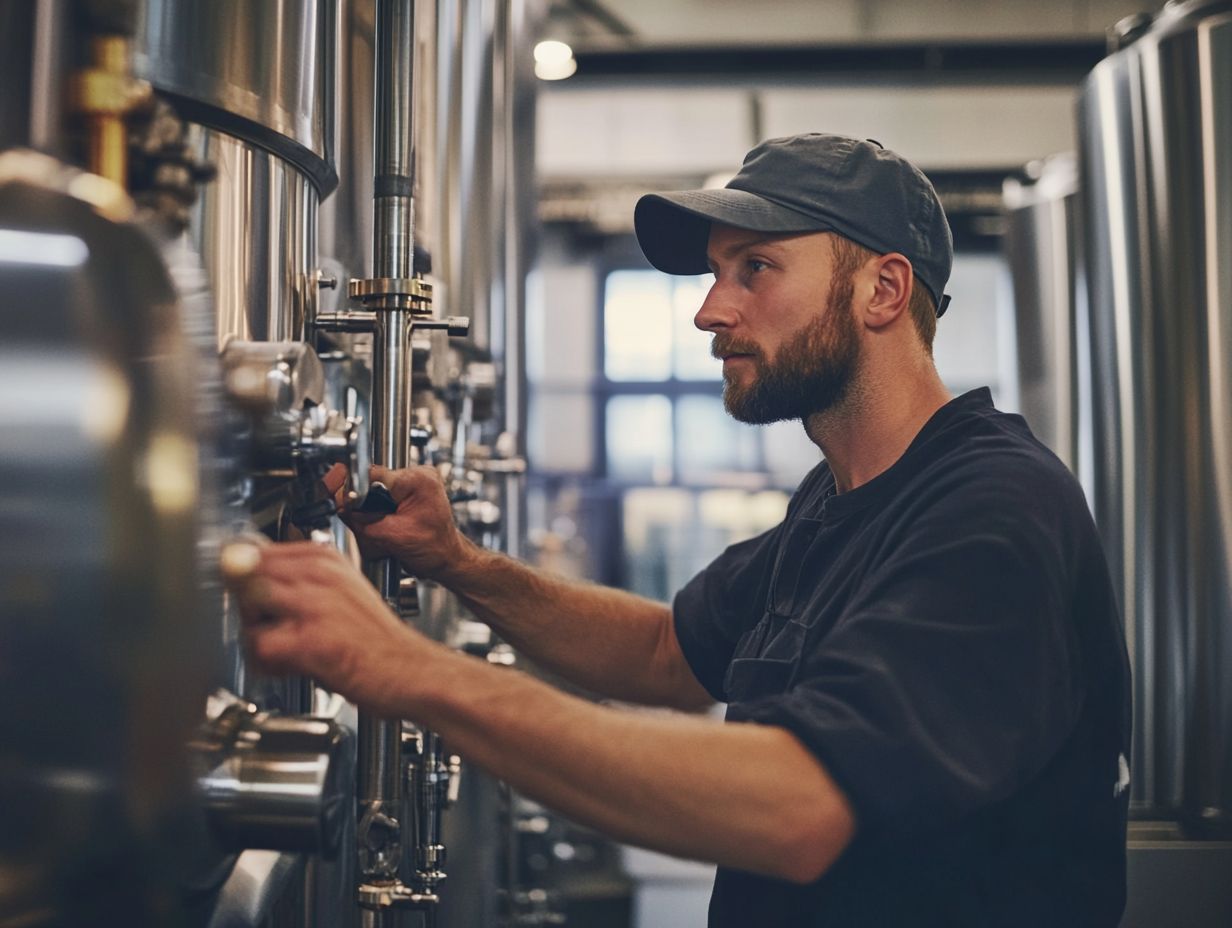
Measuring efficiency in the brewing process is absolutely vital for your brewery s success! It allows you to optimize operational performance and overall equipment effectiveness (OEE). This practice empowers you to discover areas ripe for improvement, ensuring that your brewing team upholds the highest standards in craft beer production.
Tips for Maximizing Efficiency in Brewing
To truly maximize efficiency in your brewing process, you must adopt a strategic approach that encompasses several best practices, including waste management.
Focus on using high-quality ingredients, implementing proper water treatment, and optimizing your equipment usage. Each of these elements plays a crucial role in enhancing your overall brewing performance, ensuring that every batch you produce reaches its full potential.
1. Use High-Quality Ingredients
Using high-quality ingredients is essential in the brewing process, as they significantly impact the flavor, aroma, and overall quality of the beer you produce. This ensures you meet the discerning expectations of craft beer enthusiasts.
Ensuring proper mash temperature is key to maximizing sugar extraction. When you choose premium malted grains, you not only enhance the beer s base flavor creating richer profiles and smoother textures but also boost fermentability and enzyme activity, leading to a more efficient brewing cycle.
Likewise, selecting fresh, aromatic hops introduces a unique bitterness and aromatic complexity that elevates the tasting experience to new heights. The choice of yeast is equally critical; high-quality yeast strains can improve fermentation consistency and produce desirable esters and phenols, further enhancing the beer’s aromatic quality.
Ultimately, prioritizing superior ingredients results not only in a better-tasting product but also streamlines your brewing process, allowing for greater consistency across batches and minimizing wastage.
Start implementing these tips today for a more efficient brewing process!
2. Properly Prepare and Treat Water
Properly preparing and treating your brewing water is crucial for achieving the best brewing conditions. The right balance of minerals and pH levels can significantly impact the fermentation process and overall efficiency of your brew.
Utilizing brewing software can aid in maintaining these conditions. Many brewers employ methods such as reverse osmosis, carbon filtration, and blending mineral-rich water with distilled sources to enhance their water chemistry before brewing begins.
Keeping an eye on your water usage not only aids in efficient resource management but also ensures consistency throughout the brewing process. This consistency allows you to replicate the same exceptional results with every batch. Regular calibration of equipment is also essential.
Understanding the importance of water quality in brewing transcends mere taste; it influences yeast health and fermentation kinetics. This makes it an essential consideration for those dedicated to perfecting their craft.
Ultimately, mastering the right water chemistry is a vital step to elevate the quality of your final product. Additionally, effective waste management systems contribute to achieving high-quality brews.
3. Optimize Equipment and Techniques
Optimizing your brewing equipment and techniques is crucial for achieving maximum efficiency in the brewing process. By doing so, you can fully leverage technological innovations and automated systems, significantly enhancing your operational performance.
Regular training sessions for your brewing team are essential. Incorporating state-of-the-art machinery and sophisticated brewing software allows you to save valuable time while minimizing waste. This paves the way for a more sustainable operation.
Automating your bottling and packaging processes can streamline production lines and boost throughput without sacrificing quality. Embracing these modern advancements not only enhances your productivity but also elevates the overall quality of the beer you produce.
This creates a win-win scenario for both you and your consumers.
4. Maintain Consistent Temperature and Time
Maintaining a consistent temperature and time throughout the brewing process is absolutely essential. Any fluctuations can disrupt enzymatic activity, fermentation, and ultimately the final flavor profile of your beer.
You can achieve this consistency by investing in reliable temperature control systems like thermostats and digital probes. These tools allow for precise monitoring during the mashing and fermentation stages.
Timing devices are essential for keeping track of key phases in the brewing cycle, which helps eliminate guesswork. Regular checks are your secret weapon for top-quality brews!
By creating a controlled environment where both temperature and time are meticulously managed, you can significantly enhance the overall quality of your product. This results in a more gratifying experience for consumers.
Avoid These Common Brewing Mistakes for Better Efficiency!
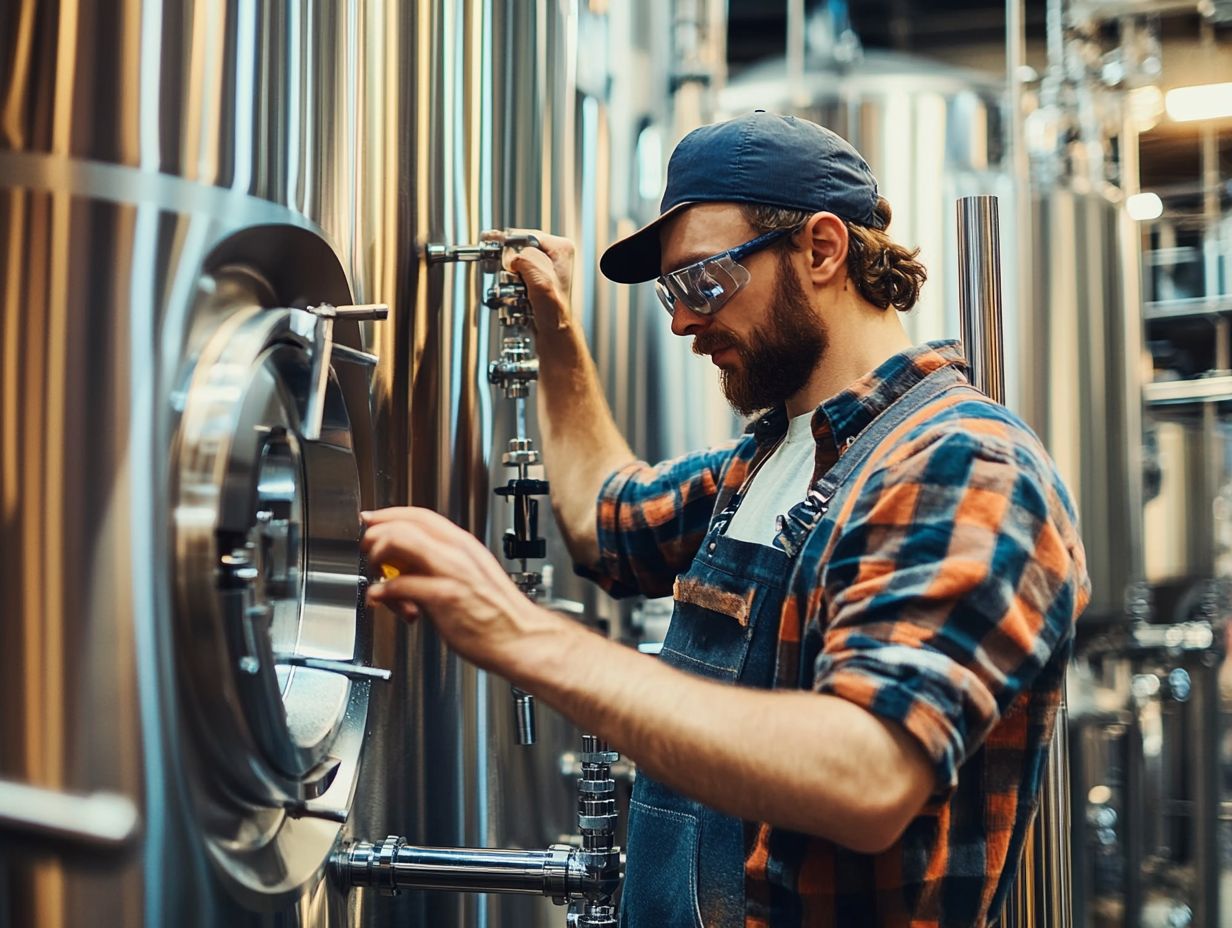
Grasping the common missteps that can hinder efficiency in the brewing process is crucial for brewing teams dedicated to crafting exceptional beer. Recognizing these pitfalls will enable you to avoid suboptimal outcomes and minimize resource wastage.
Ultimately, these improvements will elevate the quality of your craft beer.
1. Using Old or Low-Quality Ingredients
Using old or low-quality ingredients in your brewing process can seriously compromise the flavor, aroma, and overall quality of your beer. Ultimately, this results in subpar outcomes and production inefficiencies.
This focus on ingredient quality isn t just about taste; it also influences your brewing yield. Increased waste and higher costs can occur if you overlook this crucial aspect. You may find that your batches vary unpredictably, which can be frustrating for both your craft and your consumers.
By choosing high-quality, fresh ingredients, you ensure a consistent and desirable product that meets the expectations of beer enthusiasts. On the other hand, neglecting to prioritize sourcing can lead to off-flavors and tarnish your reputation in the market. This jeopardizes your brewery s success.
Choosing premium ingredients is essential for an exceptional brewing experience! It is not just a luxury; it s essential for achieving flavor excellence and fostering sustainable brewing practices.
2. Not Properly Treating Water
Neglecting to properly treat your brewing water can lead to undesirable flavors and inefficiencies in the brewing process. The makeup of your water plays a pivotal role in fermentation and the overall quality of your beer.
When essential minerals and pH levels aren t adequately balanced, you might encounter a range of issues. These issues can range from underdeveloped flavors to the over-extraction of unwanted compounds. This mismanagement compromises not just the taste of your final product but can also impede yeast activity. Insufficient carbonation and aroma are two elements crucial for a truly satisfying tasting experience.
If you overlook the significance of water treatment, you may face inconsistent batches and ultimately, unhappy customers. Therefore, understanding the intricacies of water chemistry is vital for crafting exceptional brews and achieving a flavor profile that makes each pint not just good, but unforgettable.
3. Inconsistent Techniques and Equipment
Inconsistent techniques and equipment usage can seriously undermine the efficiency of your brewing process. This leads to variations in beer quality and operational performance detrimental to your craft brewery.
To address these challenges, it s essential to adopt standardized brewing practices. These practices not only streamline your operations but also ensure a uniform flavor profile across batches. Regular maintenance checks are crucial in minimizing discrepancies that might detract from the final product.
Conducting comprehensive training sessions for your brewing team is vital in fostering a culture of consistency. This equips your staff with the knowledge and skills necessary to navigate various brewing challenges. When everyone is on the same page regarding proper procedures and equipment handling, your brewery will deliver high-quality beer that consistently meets customer expectations.
4. Poor Temperature and Time Control
Poor temperature and time control during the brewing process can lead to significant inefficiencies. This adversely impacts fermentation and results in undesirable flavors in your final product.
This control is especially critical because the enzymes responsible for breaking down sugars and shaping flavor profiles are extremely sensitive to temperature fluctuations. If the temperature strays too high or too low, enzymatic activity can slow down dramatically or even become denatured. This ultimately affects the overall quality of your brew.
To elevate your monitoring and control, consider employing digital temperature controllers that maintain specific temperature ranges. Pair these with timer systems to keep track of fermentation periods.
Regularly calibrating your equipment is essential for accuracy. Utilizing thermographic cameras can provide a comprehensive overview of temperature distribution. This enables you to make adjustments before any issues arise.
Frequently Asked Questions
What is the importance of maximizing efficiency in your brewing process?
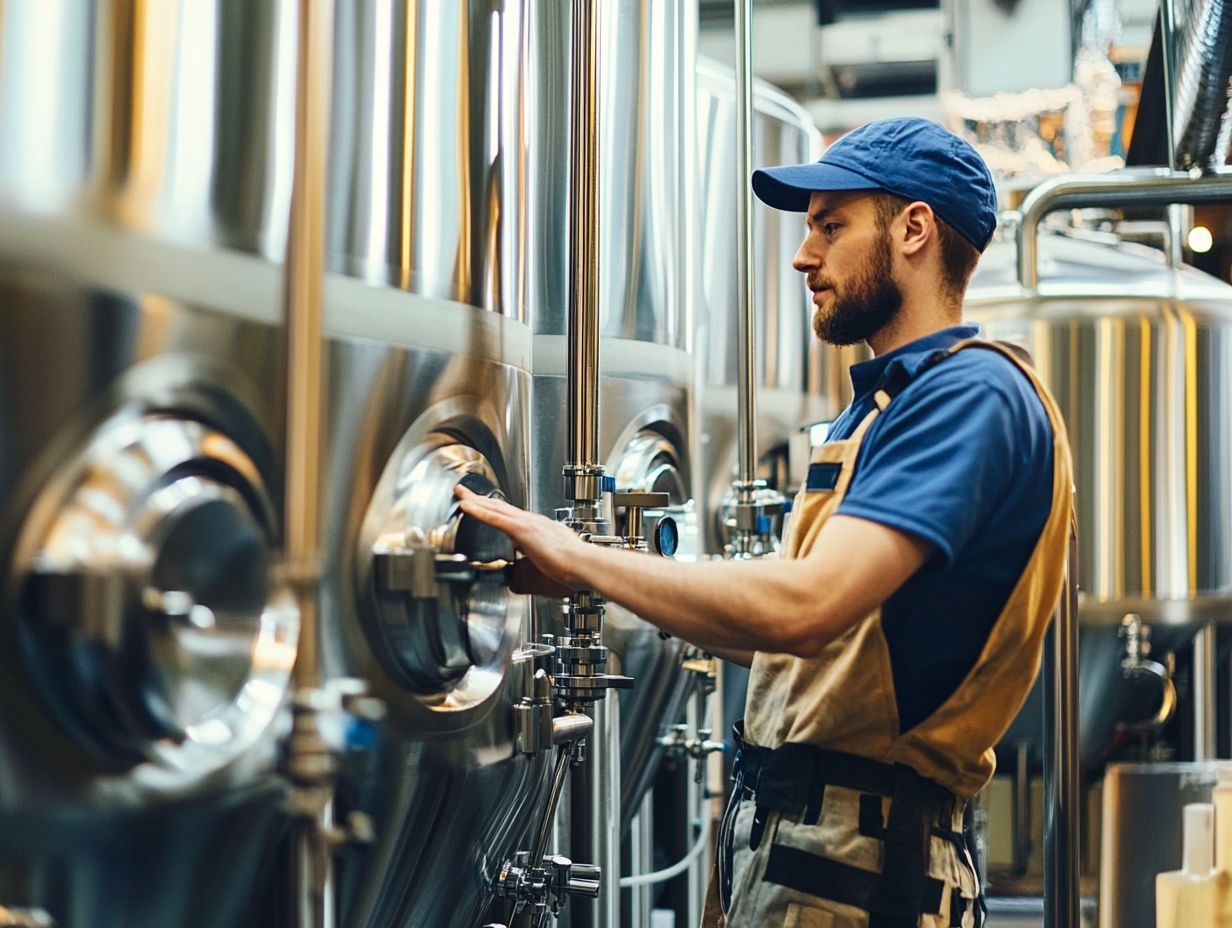
Maximizing efficiency in your brewing process can lead to cost savings, improved quality and consistency of your beer, and increased productivity.
How can I calculate my brewing efficiency?
Brewing efficiency measures how much fermentable sugar is in your wort. Compare this to the sugar you can extract from your ingredients.
What are some ways to increase efficiency in my brewing process?
To boost efficiency, use a consistent recipe. Crush your grains properly and maintain the right mash temperatures.
How can I ensure consistency in my brewing efficiency?
Achieve consistency by carefully measuring your ingredients. Record your brewing process and results to troubleshoot efficiency issues.
What are some common factors that can affect brewing efficiency?
Quality ingredients and fresh supplies play a key role. Also, pay attention to water chemistry and your brewing technique.
What are some potential consequences of low brewing efficiency?
Low brewing efficiency can lead to inconsistent beer quality. You may waste ingredients and time, ultimately increasing production costs.


